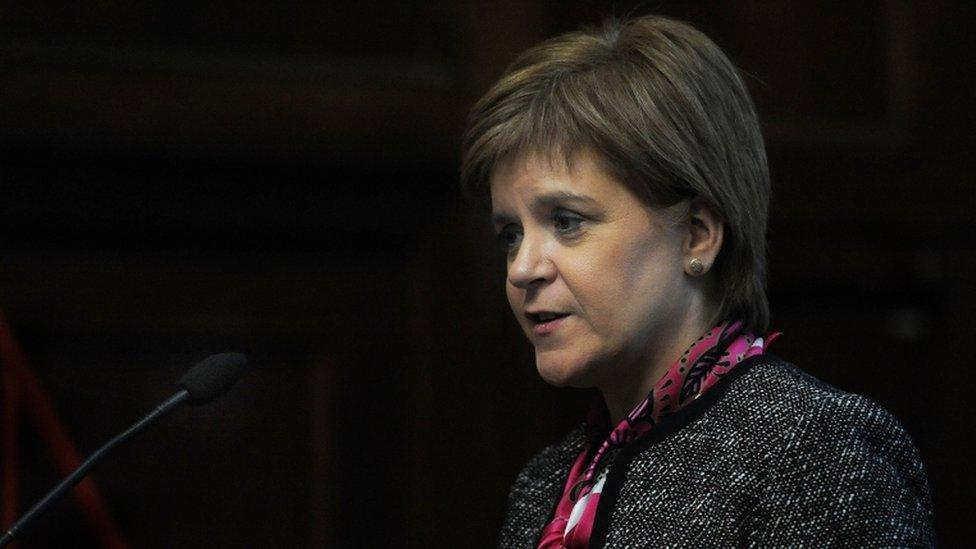Nicola Sturgeon's careful caveats over indyref2
- Published
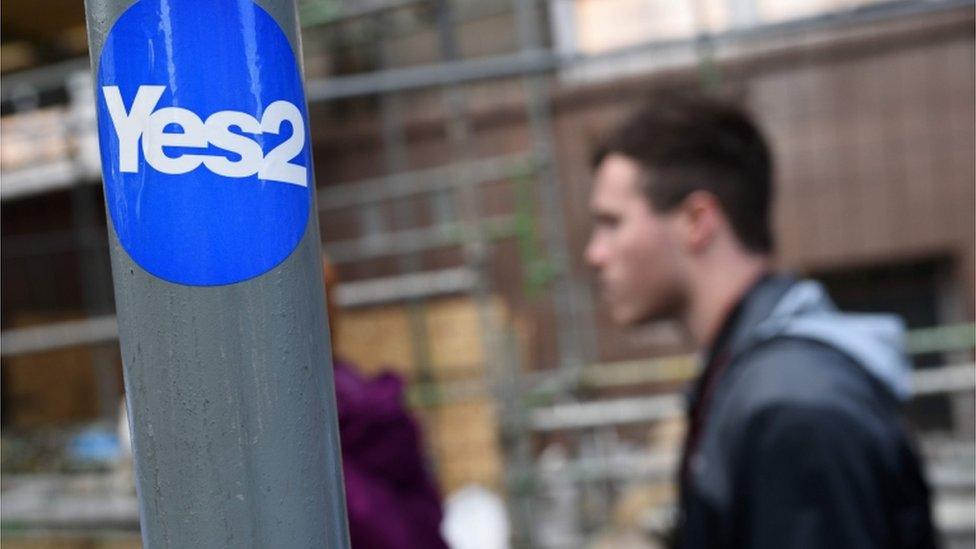
There's an old Liberal Democrat crowd chant which begins, in customary demotic fashion: "Whadda we want?"
(If, that is, the Lib Dems can be associated with anything as populist as a crowd).
It then continues with the answer: "The single transferable vote in multi-member constituencies!"
The instigator then yells: "When do we wan' it?"
And the crowd bellow back: "In due course, after the careful consideration of salient options."
You see the snag, of course? No punch. No chutzpah. Nothing to stir the blood. La Marseillaise, it is not.
Incidentally, en passant, to those who consider Flower o' Scotland a mite too sanguineous. Have you read - or, better still, sung - the French national anthem?
Is there a similar uncertainty currently afflicting the leadership of Scotland's largest party (The SNP - do keep up at the back).
Now, the Scottish National movement has seldom lacked passion throughout its history. What it lacked in the earliest days was support. It could be argued that popular backing arrived when the movement, the party, contrived to blend passion with a pragmatic approach to policy and political strategy.
But what might be the SNP chant at the moment, on the lines advanced above? "Whadda we want?" "A referendum on independence!" "When do we wan' it?" "…can we get back to you?"
To be very, very clear, I am not remotely suggesting that the SNP lacks fervour for its core aim. Quite the reverse. Nicola Sturgeon, her MSPs, her MPs, her MEPs, her councillors, her party yearn for independence. The question is how to bring it about.
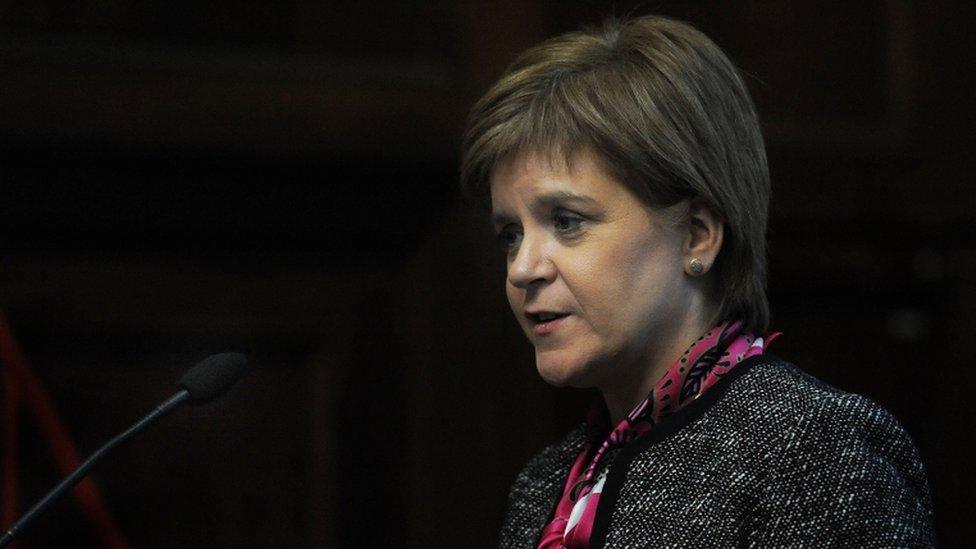
Nicola Sturgeon has accused a Westminster "faction" of trying to "rein in" Scotland
As I have written and said umpteen times, Nicola Sturgeon does not want to hold a referendum. She wants to win one. She is not remotely interested in proud gestures, in gallant defeat.
Hence the careful calculations. Political machinations which are mirrored in Downing Street, by the UK government. Are both sides preparing for a possible referendum? Of course they are. Who ever thought otherwise?
But still the first minister tenders caveats. For example, in her David Hume Institute lecture last night, she said that indyref2 might "almost be a necessary way" to protect Scottish interests post Brexit. Note that "almost".
Immediately, after the Brexit vote, she said a further referendum on independence was "highly likely". She has used variations of that formula since. Interviewed by me, she acknowledged that more recent developments made it "all but inevitable".
But still not certain. Why? For three very good reasons.
One, she wants the pre-Brexit mist (remember, we haven't left yet) to clear a little, to reveal the likely direction of travel.
Two, she wants to underline and emphasise that she made every endeavour to secure a deal for Scotland within the ambit of the UK. She wants people to grasp the concept that she tried.
And three? She fears she might lose. Especially if she gets the timing wrong, she fears defeat.
In the Hume lecture, Ms Sturgeon dealt substantively with the prospect that powers returned from Brussels might not carry on up the M1 (or M6, your choice) to reach Scotland from London.
Her estimable deputy, John Swinney, built upon this on the wireless this morning when he noted that, in addition to the devolved powers issue, he detected a dose of perfidious Albion surrounding the issue of the Sewel Convention.
Said convention was, he said, supposed to be entrenched in statute following the Smith Commission. But the ruling by the Supreme Court showed plainly that Sewel had no true legal force.
To be clear again, these are substantive issues. But I do not seriously believe that they would form a significant part of any appeal to the people of Scotland in the event of an independence referendum
Again, it's like that LibDem chant. I do not see an angry mob screeching: "For shame. They have undermined the legal status of the Sewel Convention. Aux armes, mes citoyens!"
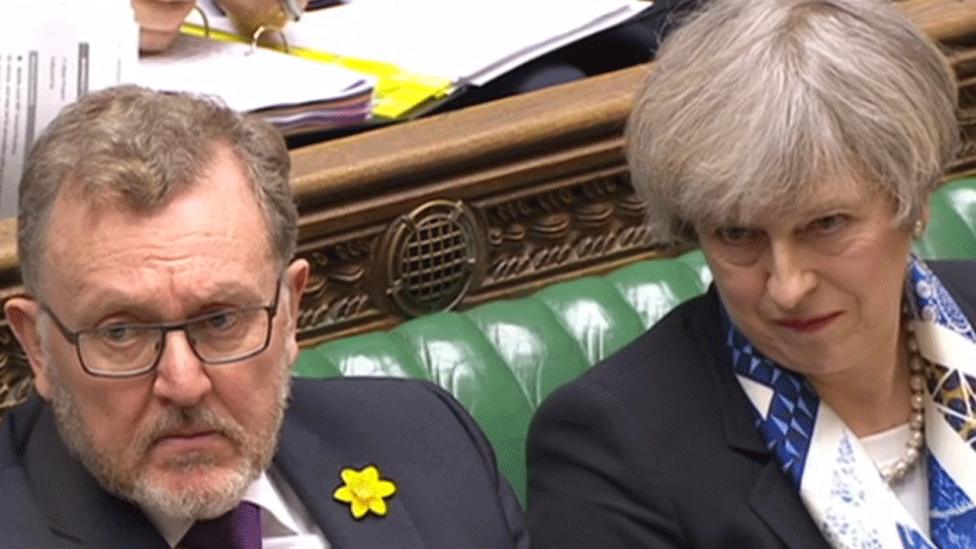
Scottish Secretary of State David Mundell and Prime Minister Theresa May were both questioned about devolution
Turning then to the repatriated powers issue. Ms Sturgeon voices concern that the UK government will seek to hold on to powers returned from Brussels, notably in the field of agriculture (and, presumably, the sea of fishing.)
But, say UK ministers, this is not about cutting existing powers. This is about establishing the best redeployment of returning powers. Their argument in this regard might be more convincing if they did not sound so sheepish and evasive in addressing the topic.
Scottish government ministers say that agriculture and fish are already devolved - and that the Brussels end of these sectors should follow suit. UKG ministers say - or, rather, hint - that they might prefer a Common Agricultural Policy (and ditto fishing) for the UK, in place of the EU version.
It is a serious topic, requiring serious negotiation. The SNP's Angus Robertson tackled the PM on it today. There had earlier been comparable challenges to the Scottish Secretary David Mundell. Neither exchange fully clarified the matter.
UK Ministers insist that Holyrood will end up with further powers - and that no existing powers will be removed. SG Ministers fret that the new agriculture and fish system, as envisaged by the UK, may prove even more constrictive and less amenable to Scottish interests than the current EU set-up.
As I say, a big deal. Worth examining. Worth tough bargaining. But not, I would suggest once more, the core of an independence campaign.
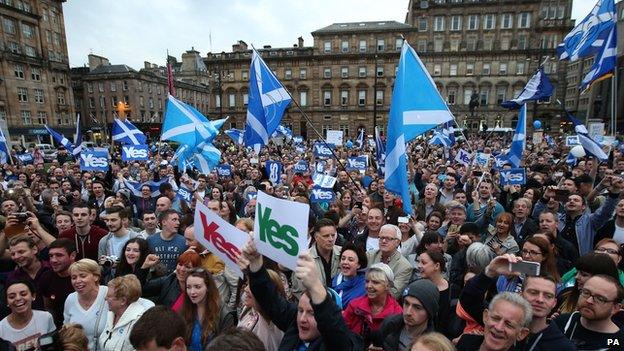
Some nationalists want to press for a second referendum quickly
Broadly, there are two schools of thought in the Nationalist movement. There are those who say: "Get on with it". Allow Article 50, signalling Brexit, to be triggered. Then press pretty swiftly for a Section 30 transfer of powers to Holyrood to permit indyref2. Hold the poll itself in autumn 2018, before Brexit actually occurs.
Those advocating this course of action tend to deploy two arguments. One, carpe diem. They say the independence cause should grasp the opportunity of disarray and uncertainty within the UK body politic.
Two, they argue that an early vote would encourage those in the EU who are sympathetic to Scotland's position to grant a relatively easy access to those EU institutions.
Alternatively, there are those who say that it is better to wait until 2019 or later, to allow the true nature of Brexit to become clear. Independence would be offered as a counterpoise: a strategy which, they say, would work better when Brexit is better understood.
On the EU, they say it is unrealistic to expect Scotland to assume membership in some form of post-UK legacy. They argue that, in either case, Scotland would have to apply - but could expect a positive response.
For now, both Theresa May and Nicola Sturgeon agree on one thing. It is in the interests of both, tactically, to persist with the search for a solution to Scotland's distinctive position within the ambit of the UK. To continue the negotiations.
For the prime minister, it offers a chance to find something, anything, which might forestall indyref2. For the first minister, it offers further evidence (see above) that she has pursued every avenue, followed every opportunity. That she has not jumped forward in a whimsical fashion but has been driven to the "all but inevitable" referendum.
- Published1 March 2017
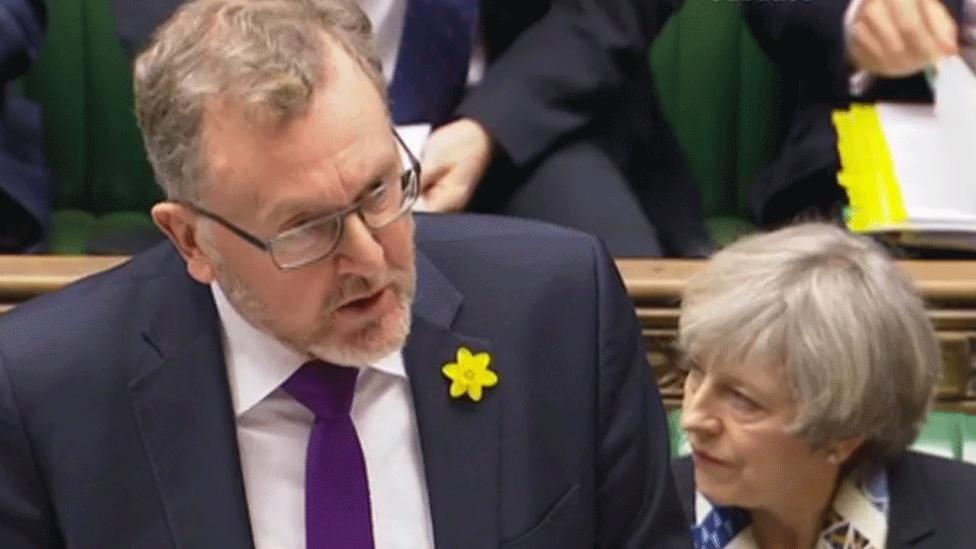
- Published1 March 2017
